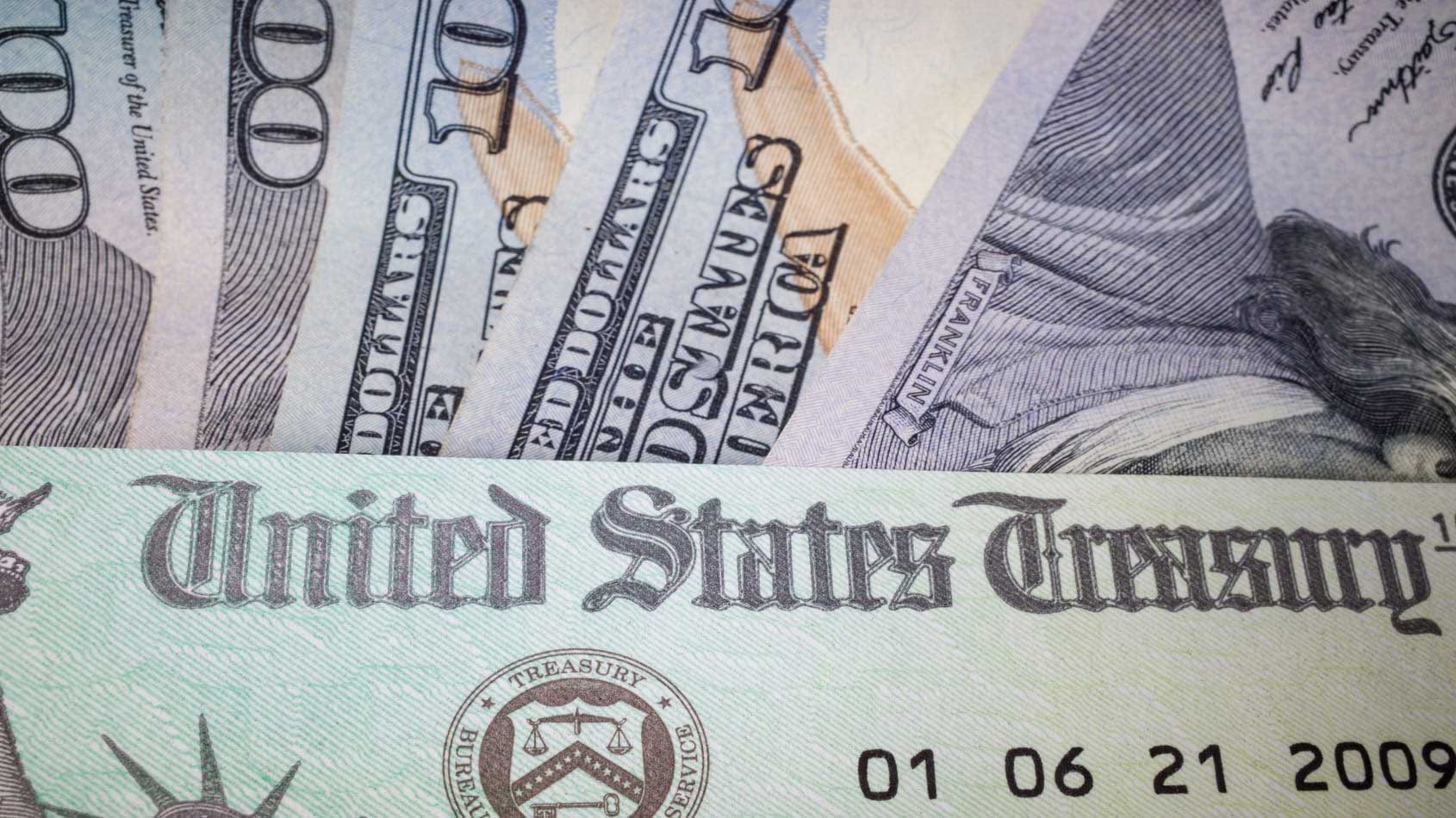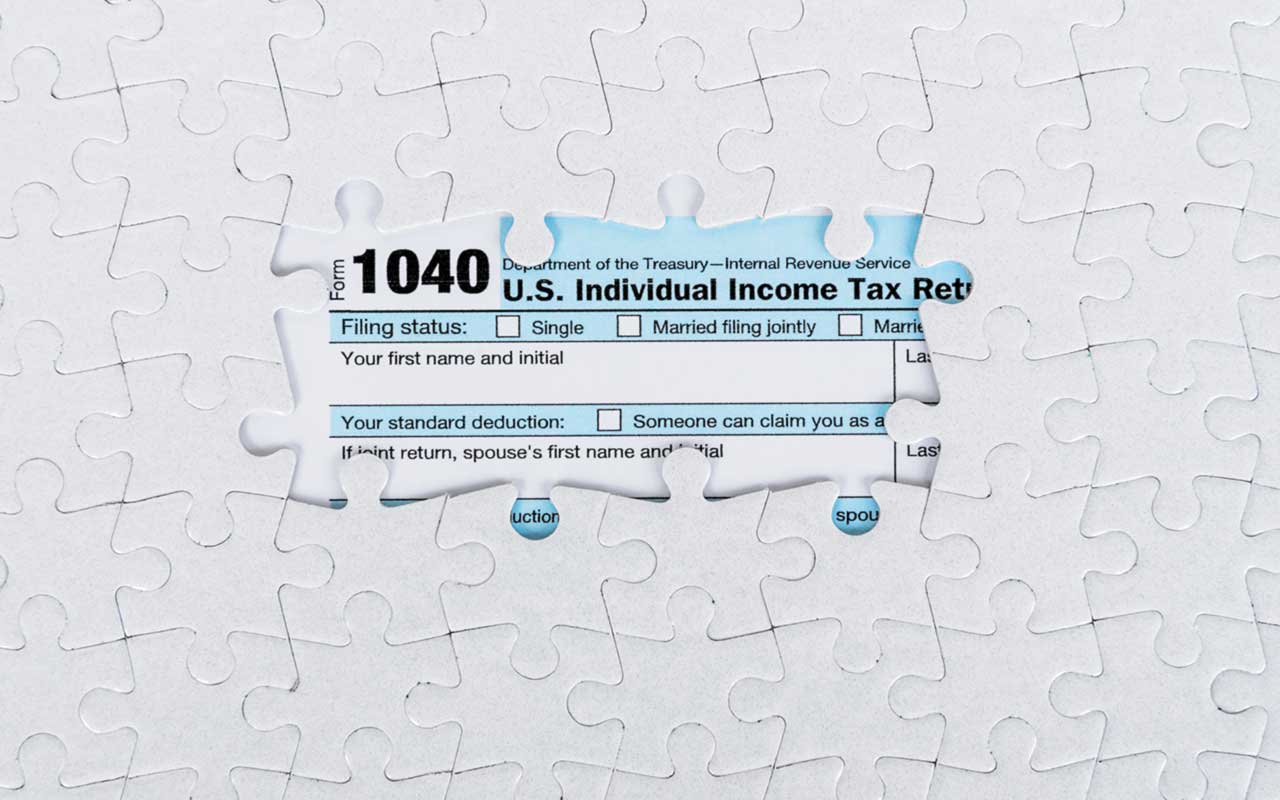Year-End Tax Moves to Save Under the New Tax Law
Sandy schools Ryan on last-minute strategies to reduce your tax bill. The duo discuss the buzz surrounding cannabis stocks and play a game of financial fact or fiction on “use it or lose it” deals.

Profit and prosper with the best of Kiplinger's advice on investing, taxes, retirement, personal finance and much more. Delivered daily. Enter your email in the box and click Sign Me Up.
You are now subscribed
Your newsletter sign-up was successful
Want to add more newsletters?

Delivered daily
Kiplinger Today
Profit and prosper with the best of Kiplinger's advice on investing, taxes, retirement, personal finance and much more delivered daily. Smart money moves start here.

Sent five days a week
Kiplinger A Step Ahead
Get practical help to make better financial decisions in your everyday life, from spending to savings on top deals.

Delivered daily
Kiplinger Closing Bell
Get today's biggest financial and investing headlines delivered to your inbox every day the U.S. stock market is open.

Sent twice a week
Kiplinger Adviser Intel
Financial pros across the country share best practices and fresh tactics to preserve and grow your wealth.

Delivered weekly
Kiplinger Tax Tips
Trim your federal and state tax bills with practical tax-planning and tax-cutting strategies.

Sent twice a week
Kiplinger Retirement Tips
Your twice-a-week guide to planning and enjoying a financially secure and richly rewarding retirement

Sent bimonthly.
Kiplinger Adviser Angle
Insights for advisers, wealth managers and other financial professionals.

Sent twice a week
Kiplinger Investing Weekly
Your twice-a-week roundup of promising stocks, funds, companies and industries you should consider, ones you should avoid, and why.

Sent weekly for six weeks
Kiplinger Invest for Retirement
Your step-by-step six-part series on how to invest for retirement, from devising a successful strategy to exactly which investments to choose.
Ryan: Well, it's December, which means there's one thing on everybody's mind - year end tax strategies. What? Just us? Seriously though, the new tax law changes the typical advice, and Sandy and I will discuss last second moves to trim your tax bill in our main segment. On today's show, we'll also get into the buzz surrounding cannabis stocks, before wrapping up with some deals to take advantage of before they disappear. That's all ahead on this episode of Your Money's Worth, stick around.
- Episode Length: 00:25:55
- Links and resources mentioned in this episode
- SUBSCRIBE: Apple Google Play Spotify Overcast RSS
Ryan: Welcome to Your Money's Worth. I'm Kiplinger staff writer Ryan Ermey, joined by senior editor Sandy Block. We're coming at you from our lovely offices in downtown Washington, D.C. And something I feel like I should know, Sandy, but I don't, do you actually live in Washington, D.C.?
Sandy: No, I just live across the river in Arlington, but I did live in D.C. for many years.
From just $107.88 $24.99 for Kiplinger Personal Finance
Become a smarter, better informed investor. Subscribe from just $107.88 $24.99, plus get up to 4 Special Issues

Sign up for Kiplinger’s Free Newsletters
Profit and prosper with the best of expert advice on investing, taxes, retirement, personal finance and more - straight to your e-mail.
Profit and prosper with the best of expert advice - straight to your e-mail.
Ryan: I'll tell you what, I went for a run last night; I like to run around my neighborhood. And even in the dead of winter, late at night, in 30 degrees or whatever it was, it's still like running through clouds of pot smoke all the time.
Sandy: I feel like when I walk to the metro every night, I'm walking though Woodstock. There's just so much weed out there.
Ryan: Well, it's something that we get pitches about all the time. It's something that people are interested in. In case you're keeping score at home, D.C. now joins 10 states ... That's Alaska, California, Colorado, Maine, Massachusetts, Michigan, Nevada, Oregon, Vermont, and Washington state ... who have all legalized recreational marijuana now.
Ryan: Canada made headlines in October for legalizing recreational marijuana nationwide. So as financial people, this, of course, raises the question: Is there money to be made investing in cannabis companies?
Sandy: That's right, and we get pitches all day long from people saying that we should write a story about pot stocks. But U.S. distributors are still pretty hamstrung by the law, right?
Ryan: Yeah. Marijuana is still a Schedule I narcotic in the U.S., meaning that it's illegal federally. That means companies run into trouble when they try to, say, do business across state lines. They have to do a ton of business in cash because a lot of financial institutions don't want to get into legal trouble. And because they're not compliant with U.S. federal law, they can't be listed on major U.S. exchanges.
Ryan: So a lot of these U.S. based companies end up being penny stocks that you can only buy over-the-counter. But as long as Canadian companies are compliant with U.S. law, meaning that they don't have any business in the U.S., they're operating totally in Canada, they can be listed on U.S. exchanges. The big blockbuster stocks that you hear about in this space are all Canadian companies that are listed on the NYSE.
Sandy: How are those Canadian stocks doing?
Ryan: Well, it's been a really wild ride. You've probably seen headlines about some of the bigger players having really shot up in October after legalization happened in Canada. And then there was a big plummet because ... Really the big problem was that a lot of these companies have failed to meet demand, and that's really not that surprising when you consider ... Legalization happens, and it's not overnight that these companies are totally equipped to handle a nationwide distribution business. They're not going to be Coca-Cola right away.
Ryan: A lot of these companies are taking some time to figure things out and spending a lot of money, and trying, and failing, and figuring out some of these issues like supply chain. They're not going to be Coca-Cola just yet. They don't really have the infrastructure in place.
Sandy: So it sounds like what you're saying is it's probably better for investors to hold off?
Ryan: Right now, it seems like that's probably the prudent thing to do, although we get the allure. Our friends at Arcview, which is a marijuana/cannabis investment research firm, estimate that North American's spending on legal cannabis was something around 12 billion dollars in 2018, and they think that can double by the end of 2021.
Ryan: When you think about it, someone is going to control the biggest slice of what is a pretty rapidly growing pie. Someone out there is going to be the Coca-Cola, the Philip Morris, or what have you, of pot, but it's just really hard to tell at this stage who that is going to be. And not only that, but they still have to compete with a black market. So any bets on pot stocks now are going to be extremely speculative, and I probably wouldn't put any money that I wasn't willing to lose in pot stocks.
Sandy: Okay, that makes sense, Ryan. I've been reading so much about the use of marijuana for medical purposes. Are there companies that I could invest in that stand to benefit, even though they're not necessarily growers and distributors of pot?
Ryan: Yeah, those major Canadian companies are interesting because they're vertically integrated growers and distributors. That's really an investment in the whole game for recreational. Whereas, you're right, the medical side of things is growing, too, worldwide.
Ryan: There a couple biotech firms in the mix when you start taking a look at pot stocks. A firm, GW Pharmaceuticals, recently scored the first FDA approval of a non-THC cannabis-based drug in order to treat epileptic disorders, and seizures, and things like that. Like any biotech firm, the viability of the company and of investing in its stock depends on approvals like that. But it still remains to be seen whether doctors are going to prescribe it and what kind of customer base exists for those kinds of drugs.
Sandy: Well, I'm still intrigued, Ryan, mainly because of my walk to the metro. Are there any other opportunities out there for people who really think that this is going to be the next big thing?
Ryan: There are other stocks, other companies, that are investing in this space, and the big one that comes up in a lot of these stories is Constellation Brands. They're an alcoholic beverage company. They're known for distributing Mexican beers, like Corona, in the U.S. They have made a pretty substantial investment in one of the big Canadian firms, one of the big Canadian growers, and so that is sort of seen as a tangential play. Of course any time we're talking about a stock here at Kiplinger's and playing a theme, like cannabis investing is, we think about what portion of that company's bottom line, or even top line, is made up by this investment.
Ryan: The cannabis investment in this case isn't really enough to move the needle on the stock right now. It doesn't make up a significant portion of the company's revenues. But if it's a stock that you like anyway, if you think that their alcohol distribution business is a good one, then maybe it's worth considering investing in the company. And that way you can have this company that you like, that also gives you a little bit of cannabis flavor, which by the way, Corona kind of has anyway.
Sandy: That sounds like great advice, Ryan. Where can listeners learn more about pot stocks?
Ryan: Well, it just so happens that I'm working on a bit of a deeper dive on pot stocks for the February issue of Kiplinger's Personal Finance magazine. Keep an eye out for it on newsstands, or find it on Kiplinger.com.
Ryan: After the break, our resident tax maven takes me to school on year-end moves. Don't go anywhere.
Ryan: On to our main segment where we usually do an expert interview, and today is no exception. It's you. Sandy Block, come on down. We're going to be talking year-end tax moves. It's something that we've covered just about every year in the magazine, but thanks to the tax overhaul, some of our standard advice may no longer apply.
Sandy: That's right, Ryan, because the tax overhaul doubled the standard deduction. So that means people who typically have itemized, may no longer have to do it. Congress estimates that only about 13% of tax payers will itemize this year. And that means some of the standard advice that we give, for example, prepaying your mortgage or your state and local property taxes so you can deduct them on this year's return instead of next year's return. Well, if you're no longer going to be claiming those deductions ... I mean, I'm sure that your bank, or the state, won't turn down any money, but it may not make sense to do that. And there's a lot of other things that are changing too.
Sandy: We really won't know how that's going to affect people on an individual basis until they do their tax returns, because some people will still itemize. But it does turn a lot of things on its head.
Ryan: Why might someone consider prepaying 2019 bills now?
Sandy: Well, the main reason is because you get to take the deduction sooner rather than later.
Ryan: I see.
Sandy: And in some cases ... And this still may be true. If you're close to the threshold, for example, the standard deduction for a single person has risen to $12,000. Well, if you know ... Maybe you bought a house and you have a lot of mortgage payments, a lot of mortgage interest, but you're very close to $12,000, prepaying the bills might get you over the top and then you would itemize.
Sandy: That's really important for people who give to charity. If you think you're close to the threshold of itemizing, it makes a lot of sense to bulk up your charitable contributions this year because that could lower your taxes. And what people may end up doing in the future, is maybe giving twice as much to charity one year and not the next, so they itemize some years and claim the standard deduction in others.
Ryan: So the idea is, for charitable giving at least, it's a way to reduce your taxable income, right?
Sandy: That's right. But again, if you're claiming the standard deduction ... And many, many people will be claiming the standard deduction ... giving to charity is going to be giving from your heart, not because it's going to lower your taxes. It will be really interesting going forward to see how that affects ... Charities are very concerned about this, so it really will be interesting to see how the fact that you don't get a tax break might still cause you to give or not.
Ryan: Charitable giving is sort of a classic year-end thing that we talk about, another is that people get bonuses at the end of the year. So that ties into your tax strategy too, right?
Sandy: That's right. If you're lucky enough to get a bonus, you may want to resist the temptation to spend it, and put it in your 401k instead. A lot of companies will give you that option. You can put a lot of money in your 401k, and most people don't even come close to the total, which is 18500 if you're under 50 and 6000 more than that if you're over 50.
Sandy: So if you get this bonus, and you don't need it to keep the lights on, why not sock it in your 401k? Not only will you increase your financial security in retirement, but you will lower your taxes, and that is not affected by the tax overhaul. Contributing to your 401k is still the most effective way to lower your tax bill, no matter what your tax rate is.
Ryan: What about people who have kids? Now, that's always a more complicated tax situation, right? Actually, I don't know. Have things gotten more complicated, have they gotten easier for people with kids? What's the strategy?
Sandy: Well, the strategy here, I think, it depends on the age of your kids. If you have kids in college, one thing that still makes a lot of sense is to prepay, maybe, a college bill that's due in January so that you can take full advantage of the American Opportunity Tax Credit which is worth up to 2500 dollars for every kid you have in undergraduate college. Now, you don't have to itemize to claim. This is available to anyone, and it is a dollar for dollar reduction in your tax bill.
Sandy: A tax credit is the most valuable tax break you can get. So if you have a kid in college, you haven't already maxed out on this credit, I would definitely recommend prepaying some of your 2019 bills so you can take this credit when you file your taxes. Because if you have a kid in college, you are going to need that money.
Ryan: Right. And that's one, if I'm not mistaken, you can take it for four years that your kid is in school, right?
Sandy: Every year that your kid is a full-time undergraduate student, you're eligible for this credit. If you have more than one kid, you can claim more than one credit. This is one you don't want to overlook. And again, you don't have to itemize to claim it, so I would definitely look into prepaying your college expenses if you happen to have the money.
Ryan: That's why I'm having more kids, things are looking up. What about little kids?
Sandy:Well, if you have little kids, hopefully they're going to go to college someday.
Ryan: You'd like to think.
Sandy: Contributing to a 529 college savings plan is a very tax-effective way to save for their college expenses. Now, you don't get a federal tax break on contributions to your 529 plan, but many states do allow you to deduct all or part of your contribution. And if you make that contribution by the end of the year, then you can claim that deduction when you file your state tax return next year. So check that out.
Sandy: That's, again, just as contributing to your 401k lowers your taxes and increases your retirement security, contributing to a 529 college savings plan increases your children's financial security and might lower your state taxes as well.
Ryan: Yeah, this is something I've dealt with a little bit, because it does creep into that investing territory. Now, I know that some states give you a break only if you invest in their plan. Whereas, some states will give you a break for investing in other plans. So it pays to shop around, right?
Sandy: It definitely pays to shop around. A good place to research plans is savingforcollege.com, which is a great warehouse for all things about 529 plans. If you have a crummy plan with lousy investments and high fees, maybe you don't want to ... Because you can invest in any state's plan. But if your own state has a good plan, and it offers a tax deduction, there's really no reason to go anywhere else.
Ryan: Right. On the flip side, if your state doesn't offer any deduction anyway, you might as well invest in the best one that you can.
Sandy: That's right, and the same goes for the nine states that have no state income tax. In that case, the country is your oyster, look for any plan that suits you best. And there are lots of good resources out there, in our magazine and elsewhere on our website, where you can research the lowest cost, most effective plans.
Ryan: Yeah, and we'll put the links for all of our content on that in the show notes for this episode. So is there anything else that you think is essential for people to remember as they're going into the end of the year, as they're trying to reduce the tax bill? Of course, we never advocate evading your taxes, but avoiding them within whatever the law is, is absolutely okay. Is there anything else that people should be remembering?
Sandy: I just think at this time of year, it's a good idea to do a quick run-through to make sure you're not overlooking any potential tax breaks that expire at the end of the year. One thing that I think, particularly for older folks or anybody who's had a serious medical problem, is to add up all of your un-reimbursed medical expenses over the year. If you have a lot, you might be able to deduct them on your tax return. You might want to have some things done between now and the end of the year to get yourself over the threshold for that. So that's something I would take a look at.
Sandy: And again, particularly this year, do a back-of-the-envelope calculation about what you think your deductions are going to be. If you're close to the threshold for itemizing, look for some last minute tax breaks you could take advantage of that would just get you over that hump so you will itemize when you file your tax return.
Ryan: Well, I'm a nailed-on standard deduction guy. Dad, if you're out there, make sure you're listening. Check in on this stuff. Sandy, fantastic advice as always. Thank you.
Sandy: Thanks, Ryan.
Ryan: Coming up, you may have money you've got to use or lose. It's financial fact or fiction, next.
Ryan: Alright, before we go, Sandy and I wanted to wrap things up with a little game of financial fact or fiction. Sandy, you're up first.
Sandy: Now that Sears has filed for bankruptcy, Sears gift cards are worthless.
Ryan: I seem to remember there being something like this with Toys"R"Us. So I'm going to say fact, they're worthless.
Sandy: No, fiction. Sears has made it clear that it will accept gift cards in all of its stores, the ones that are still open, as well as on its website. Gift cards are still valid.
Sandy: However, if you happen to have one or you get one for Christmas, we really encourage you to use them as quickly as possible. Because as you mentioned with Toys"R"Us, when they filed for bankruptcy and then were forced into liquidation, they gave gift card holders only 30 days to redeem the value of their gift cards. So not only did people have to rush to stores, but they found a vastly depleted supply of toys in which to buy. Our advice is if you have a gift card from Sears, go out and buy yourself some tires, or shirts, or socks as soon as you can.
Ryan: Especially if you get a gift card for Christmas from someone who is really not on the ball. From one use it or lose it scenario to another, fact or fiction: You can use dollars from your flexible spending account for co-payments, deductibles, prescription drugs, and other out-of-pocket medical costs.
Sandy: That is a fact, Ryan, because I have had a flexible spending account in the past and I have used it for all of those things.
Ryan: That is a fact. And let's review really quickly, a flexible spending account is something that you can contribute to, and you can use money from this account to pay for medical expenses. But if you have an HSA, health savings account, that comes with a high deductible plan, those funds rollover to the next year. But flex accounts typically don't.
Sandy: Right. Some companies require you to use up all the money by the end of the year, and others may give you until the end of the first quarter to use the money. But there is this use it or lose it thing hanging over your head, that you have to spend the money.
Ryan: Yeah, a lot of people try get creative, especially if they have a lot of money left over. Our good friend, Kim Lankford, our lovely colleague, says you can stock up on items you can use throughout the year: contact lenses, prescription sunglasses, contact lens solution, sunscreen with a high SPF, back and knee braces, heat and cold packs, first aid kits.
Ryan: But I thought we could get a little bonus fact or fiction round. I've gone to fsastore.com, which is where you can find out if certain purchases qualify, and found some out-of-the-box stuff. I'm going to put you to the test here.
Sandy: Hit me, Ryan.
Ryan: Alright. First thing's first, can you get acupuncture with your FSA funds?
Sandy: I would say no.
Ryan: You can. Acupuncture and chiropractic, both available with FSA funds. What about aromatherapy?
Sandy: Ooh, aromatherapy. That just sounds too weird.
Ryan: It is too weird, you can't do that one. What about programs to quit smoking?
Sandy: I think that would be yes, because the government wants us all to quit smoking.
Ryan: Yes, indeed. You can use programs to quit smoking, and you can purchase gum or nicotine patches if prescribed to you by your doctor. Botox?
Sandy: I hope not.
Ryan: No, with a caveat. Surgery is covered, but no plastic surgery is covered. But if you're prescribed Botox for something else, say your migraines, that can be covered.
Sandy: Headaches that make you look better, okay.
Ryan: Exactly right. Breast pumps?
Sandy: Yes.
Ryan: Yes, indeed. What about diapers and baby formula?
Sandy: Ooh, tough one. I'd say no.
Ryan: That is correct, with the very small caveat that if you have prescription baby formula, if your baby needs special formula, your FSA will cover the difference between the normal baby formula and the special baby formula.
Sandy: That's too bad, because if those things were covered, nobody would ever have to forfeit any FSA funds. That's anybody with kids.
Ryan: Alright. Deodorant?
Sandy: No.
Ryan: No. Dental floss?
Sandy: Ooh, tough one. Yes.
Ryan: No.
Sandy: Darn!
Ryan: No dental floss.
Sandy: No dental floss!
Ryan: What about gym memberships?
Sandy: Ooh, tough one, because that does improve your health. No.
Ryan: Correct, no. However, once again, if you've been diagnosed with obesity or something like that and your doctor recommends a weight loss program, you may be able to get a letter of medical necessity that you can submit to your provider, and they may be able to cover that. Alright, last one here. Over-the-counter medication?
Sandy: I would think no.
Ryan: You actually can. Just the tricky thing is, you have to get a prescription. So if you can get your doctor to write you a prescription for Claritin, or ibuprofen, or Nasacort, or whatever you take, that is going to be eligible for FSA funds. And there's all kinds of stuff, really. You've got your Dr. Scholl's inserts and things like first aid kits. I think someone in this office got first aid kits for all of their grandchildren, for Christmas one year, because they had to spend down their FSA.
Ryan: So the advice is go to fsastore.com. You can see a list of everything that is eligible with the caveats that we talked about, whether you need a prescription or a letter of medical necessity. And you too could be stuffing your family stockings with the likes of first aid kits, and ibuprofen, and Dr. Scholl's.
Ryan: Thanks, Ryan.
Ryan: That's it for this episode of Your Money's Worth. For show notes and more great Kiplinger content on the topics we discussed on today's show, go to kiplinger.com/links/podcasts. You can stay connected with us on Twitter, on Facebook or by emailing us podcasts@kiplinger.com. And if you like the show, please remember to rate, review and subscribe to Your Money's Worth wherever you get your podcasts. Thanks for listening.
Links and resources mentioned in this episode
Profit and prosper with the best of Kiplinger's advice on investing, taxes, retirement, personal finance and much more. Delivered daily. Enter your email in the box and click Sign Me Up.

Block joined Kiplinger in June 2012 from USA Today, where she was a reporter and personal finance columnist for more than 15 years. Prior to that, she worked for the Akron Beacon-Journal and Dow Jones Newswires. In 1993, she was a Knight-Bagehot fellow in economics and business journalism at the Columbia University Graduate School of Journalism. She has a BA in communications from Bethany College in Bethany, W.Va.
-
 How Much It Costs to Host a Super Bowl Party in 2026
How Much It Costs to Host a Super Bowl Party in 2026Hosting a Super Bowl party in 2026 could cost you. Here's a breakdown of food, drink and entertainment costs — plus ways to save.
-
 3 Reasons to Use a 5-Year CD As You Approach Retirement
3 Reasons to Use a 5-Year CD As You Approach RetirementA five-year CD can help you reach other milestones as you approach retirement.
-
 Your Adult Kids Are Doing Fine. Is It Time To Spend Some of Their Inheritance?
Your Adult Kids Are Doing Fine. Is It Time To Spend Some of Their Inheritance?If your kids are successful, do they need an inheritance? Ask yourself these four questions before passing down another dollar.
-
 PODCAST: Decoding ESG Investing with Ellen Kennedy
PODCAST: Decoding ESG Investing with Ellen KennedyBecoming an Investor Environmental, social and governance investing is simpler than it sounds, and has a profitable track record to boot.
-
 PODCAST: National Taxpayer Advocate Erin M. Collins Wants to Help
PODCAST: National Taxpayer Advocate Erin M. Collins Wants to HelpFinancial Planning Your tax dollars are at work funding a government bureau to help you deal with the IRS. Strange but true! Also, the price of Amazon is going up.
-
 PODCAST: The “Gray Resignation” with Liz Windisch
PODCAST: The “Gray Resignation” with Liz WindischMaking Your Money Last Pandemic pressures (and high stock and real estate values) are leading many to try to move up retirement. Plus, tax-filing season gets under way.
-
 PODCAST: Get the Most from the Expanded Child Tax Credit
PODCAST: Get the Most from the Expanded Child Tax CreditTax Breaks The latest government stimulus is a much-more generous child tax credit, with a new twist: The IRS is going to send you money each month, if you're eligible. Also, what marrying will do to your taxes.
-
 PODCAST: Max Out Your Stimulus Check with Rocky Mengle
PODCAST: Max Out Your Stimulus Check with Rocky MengleTax Breaks You probably know you're getting a stimulus check, but did you know you can have an impact on its amount? Senior tax editor Rocky Mengle talks about the moves you can make to upsize your stimulus. Also, will your state raise — or lower — your taxes.
-
 PODCAST: Why Pay Money to File Your Taxes?
PODCAST: Why Pay Money to File Your Taxes?Tax Breaks Far more people could be filing their federal returns for free; maybe even their state taxes. Also, the latest from Brandon Copeland and the not-so-secret perks of stock ownership.
-
 PODCAST: Taxes and Insurance When Working from “Home”
PODCAST: Taxes and Insurance When Working from “Home”Tax Breaks Working remotely in a new state, maybe even a new country? That can lead to complications, particularly when it comes to taxes. Also: why the IRS is starting tax season late this year, and a check-in on student loan policies in the new administration.
-
 PODCAST: Taxes on Retirees — What’s New
PODCAST: Taxes on Retirees — What’s NewBudgeting In this episode of Your Money's Worth, senior tax editor Rocky Mengle talks about the latest update of the Kiplinger Retiree Tax Map. Will states with declining revenues make life harder on retirees? Also, the Biden stimulus plan and the hazards of patent scams.

